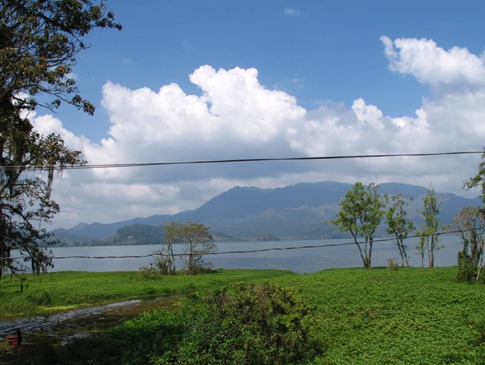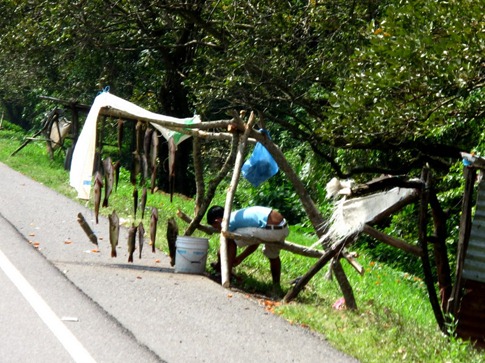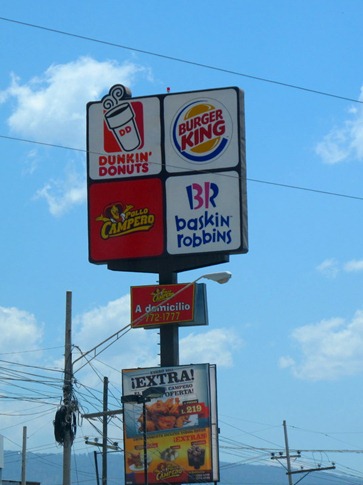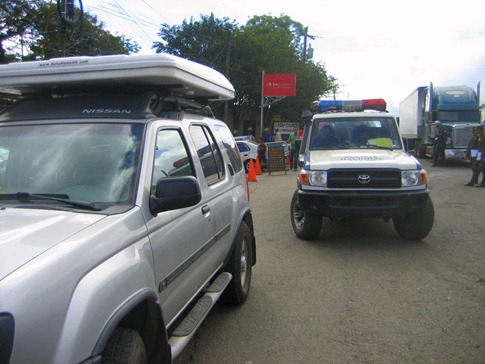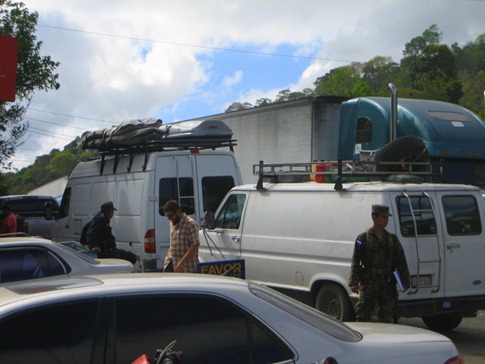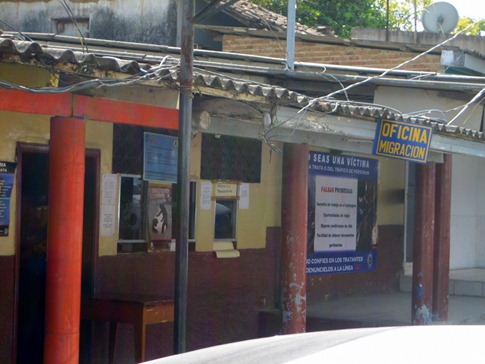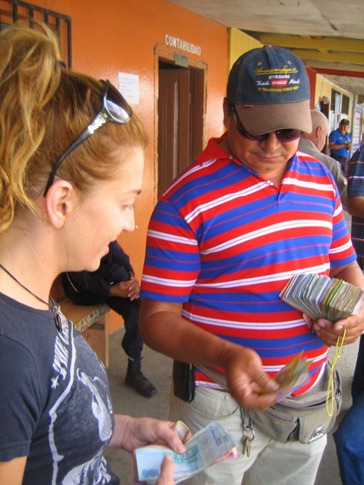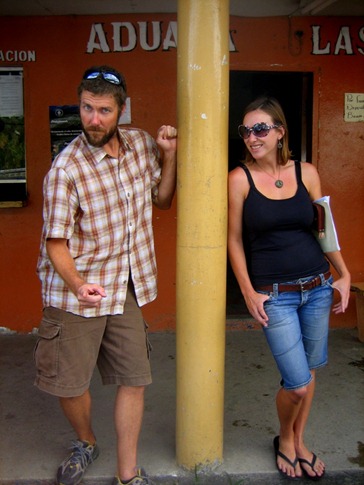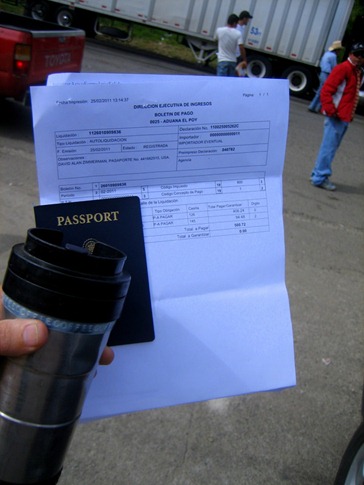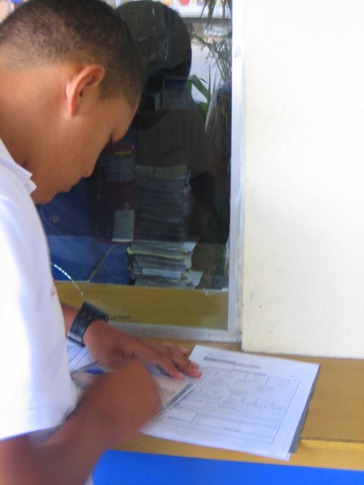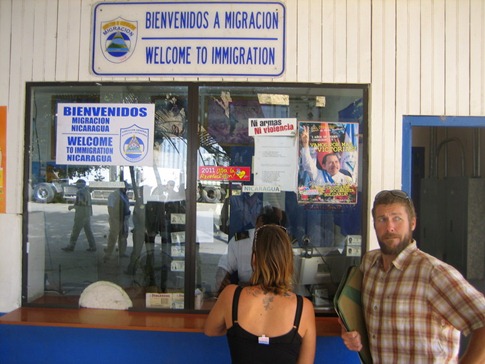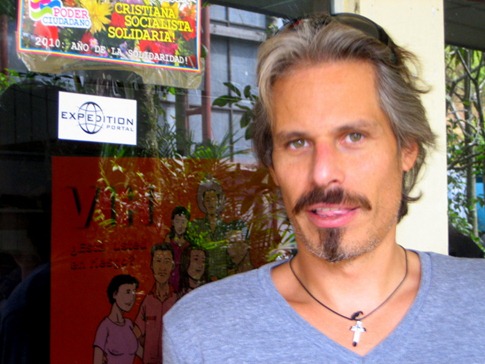We’d only caught a glimpse of Lago de Yajoa from a wrong turn on during the drive in. Now, we were following a road along its beautiful east shore. A large lake with deep blue waters and steep mountainous banks, it looked like it would have been fun to spend some more time on it. But despite having enjoyed our time at the brewery and the waterfall, we were still on a mission to get through Honduras without incident.
Ol’ Hondo gave it one last try at a final police checkpoint. Being the first in line, they always saw our foreign plates first and waved us over. By the time they noticed the two vans behind us, undoubtedly filled with unregistered dogs and freewheelin’ hippies, it was too late. This time it was “Triangulos?” I nodded and responded that I had them. “Triangulos,” he tried again, not wanting to believe that the gringo was actually prepared for his fabricated request. As I’ve mentioned before, this scam is renowned in the overlanding community, and whether a law actually exists or not, you’d be asking for it to travel through Honduras without two triangles and a fire extinguisher. He gestured for me to show them to him. Having forgotten that I’d planned to put them somewhere accessible, I started going about the process of unscrewing the rear cross bar of the roof rack to access the storage boxes under the roof tent. When he walked around back to check on my progress, I gave him a “Almost there! Just 5 or 10 more minutes!” smile. He just put up his hand for me to stop and waved us on.
We got through the capital city of Tegucigalpa without problems from cops or road signs, though we were tempted to stop for Dunkin’ Donuts. Beyond were rolling hills sparsely covered with pine trees, giving the impression of a half-assed effort at reforestation after rampant logging that culminated in the 70’s and 80’s. Near the border, tobacco processing plants were just changing shifts, and a flow of uniformed workers were walking or riding their bikes out the front gates. Large wooden warehouses by the side of the road were probably used for storage or drying.
The plan was to stop in the afternoon and hit the border first thing in the morning. In the town of El Paraiso, hotel options were slim, and we ended up at the only place in town with a gated lot. It had a nice interior courtyard with a bridge over a pond and maybe 20 rooms, though it was hard to know who exactly would ever stay there. The town itself had one main drag with mostly dirt side streets and not much going on. Chad liked to think he was the talk of the town, walking up to buy a rotisserie chicken flanked by two hot gringas, Ann and Stevie.
At a hotel, each couple in our caravan has its own approach to arrival. Honestly, Ann and I just want to grab a couple things from behind the seats, throw ‘em into our backpacks and lie down on the bed for 15 minutes. Tree and Stevie will usually pay for everything up front, then find an opportune time to surreptitiously walk in a side entrance with Kiki. The idea is that it’s a lot harder for the management to say no to a dog once they have your money; In the event that there’s a problem, usually a couple extra bucks smooths everything. Chad and Emily are sticking to a strict budget so will usually wait until we all get checked in before approaching the management with a proposition; Since their friends are staying there and paying full price, could they pay a few bucks and sleep in their van in the parking lot? It’s worked this way pretty much everywhere we’ve stayed as a group, and in the end, everyone’s happy.
That night, we drank beers and ate rotisserie chickens in the courtyard of the hotel. Just as we settled into our beds around “overlander’s midnight,” 9:00 pm, the disco next door started up. Bass was thumping and people were screaming for about half an hour before the power went out in the middle of that one catchy Black Eyed Peas song. Ironically, it was only just then that I had a feeling that tonight was, in fact, gonna be a good night (woo hooo!).
In the morning, Chad and I walked a few blocks to a coffee shop we’d seen the day before. As we approached the counter, the girl behind the register let out a sigh and said, “Aye, no tengo energia.” I know how you feel, I thought, I don’t have any energy either until I get my morning coffee. We very slowly realized she was telling us that the power was out, and there was no “energia” to run the coffee machines. Stupid gringos.
The smaller Las Manos crossing from Honduras into Nicaragua felt a bit like a western frontier town. Things were pretty easy on the Honduran side. We paid 60 Lempira ($3) each at the Migracion window to exit and a customs agent actually came to us to collect our vehicle permits. He processed them all together, walking to each truck to confirm VIN’s, and after changing some money, we were out of Honduras before I’d even finished my morning coffee. The agents in El Poy who had taken an hour for each truck should be taking notes from these guys.
On the Nicaragua side, our group was quickly attached by a clean cut young guy wearing a polo shirt from an insurance company. After confirming that insurance was in fact required in Nicaragua, we each agreed to buy the $12 policy from him, and he walked us through the rest of the border process.
At the first window on the left after a checkpoint, two guys took our passports and filled out a small form with our information. Our friend the insurance agent suggested we might want to tip them. A little annoyed that we could have just filled out the forms ourselves but acknowledging that it was nice we didn’t have to, I gave each of them 10 Honduran Lempiras ($0.50), and they seemed happy with it. Our helper walked us down to immigration, greeted the agent behind the window with a friendly handshake and presented us. We paid 270 Nicaraguan Cordoba (like $12) per couple to enter but were given a $4 receipt. Not quite sure what happened there, but it was the same for everyone we saw after us. A guy came by asking for $1 per person for some kind of municipal tax which sounded familiar to us from one of the blogs we’d read. And it came with a receipt, so it felt legit (even if Chad’s face below doesn’t look like he agrees).
Note the ExPo sticker…
For the vehicle permits, we just hung around handing documents to our insurance guy when he asked for them. He then ran to grab an inspector to look at each truck. The inspector asked us to open our rear hatch including folding down the table and just said, “Ah, comida.” He looked inside the Sprinter to see Stevie splayed out on the bed, screening Kiki. Remember, best practice seems to be to try to get the dogs across under the radar before declaring them. Finally, he opened the back of Chad and Emily’s van to find Luna panting back at him from the top of the load which required them to go across the street to start another process of clearing the dog. After a few minutes, with a couple signatures, we paid our insurance agent $15 for the $12 policy and were clear to cross into Nicaragua.

